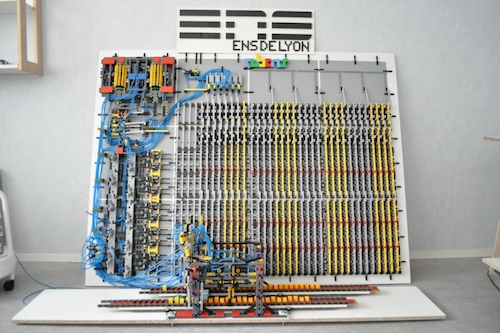 Intelligent Design
Intelligent Design
Intelligent Design in Action: Informatics

You can find a good if brief look at the science of informatics over at Phys.org (“Logic in Computer Science“). The article by Florian Aigner begins with a photo of a Turing machine constructed out of Lego pieces. More on Turing machines in a bit; first, it’s important to know where and when the new science of informatics was born:
All men are mortal. Socrates is a man. Therefore, Socrates is mortal. Logical arguments like this one have been studied since antiquity. In the last few decades, however, logic research has changed considerably: the computer sciences were born. The success of informatics would have been impossible without the groundwork provided by logicians — and, in turn, computer sciences keep posing new interesting questions, which can only be answered by formal logic. Informatics is not the modern-day successor of logic, both fields keep moving forward, hand in hand.
Informatics is roughly equivalent to computer science or “information processing.” It can, however, be independent of any computer hardware. It concerns not so much actual implementation as much as concepts and theories about what problems are meaningful, logical, and tractable. It is also concerned with data integrity: ensuring the validity and reliability of answers.
Classical logic, with its syllogisms and wordy arguments, has given rise to symbolic logic: operations with symbols that, following logical rules, make predictable outcomes. Informatics seeks to determine what calculations are conceptually solvable, even if never realized. The Turing machine is a case in point. In the 1930s, Alan Turing conceived of a device that could solve any mathematical problem that is “in principle” solvable. A Turing machine could be constructed out of a tape reader, gears, or Lego pieces; even if slow or inefficient, the machine could solve any problem eventually. Turing realized that some questions can never be answered by a computer.
Informatics is replete with flowcharts, logical operations, and symbols understandable only to the initiated. Yet it is built on the foundation of classical logic and the Boolean logic that made classical logic expressible in mathematical terms. Certain operations are permitted, others forbidden; logic “gates” then become the basis of circuit design, where logic flows from switch to switch. Chains of operations can quickly become very complex. Modern software, with its abundant “if-then” conditions, can become so complex that it would take too long to test every possible outcome. A job for informatics, then, is to decide the most likely conditions that are worth testing to provide an agreed-on measure of reliability for the software’s function. A system for airline safety will require more rigorous standards than one for locating the best price for a widget, for instance.
Other examples of informatics in practice include network optimization, information security, software robustness, database normalization, operations research (efficiency expertise), systems design, and artificial intelligence. Aigner mentions that informatics has the distinction of thinking like a human being:
But logic does not only help a computer to view the world, it also offers the possibility of introspection: computer codes can check other computer codes and look for logical errors. “It is similar to the way we humans think“, says Helmut Veith. “We think about the world around us, but we can also contemplate ourselves and our own mind.”
Informatics is obviously vital to our high-tech world. As with most other sciences, it is highly methodological and mathematical, it makes predictions, it is testable, it is falsifiable, it uses models, it is subject to peer review, and its findings are published in journals like Applied Computing and Informatics. Though none of these criteria are necessary or sufficient to qualify a field as scientific, few could deny the scientific credentials of informatics.
If there is any field that unquestionably qualifies as a design-based science, informatics surely is one. All the ID concepts are here: irreducible complexity, complex specified information, design detection, optimization, logical inference … you name it. Informatics is about as un-Darwinian as science gets. (That includes “evolutionary computing” which is actually intelligent design.)
The question then becomes, if intelligent design is integral to fruitful sciences like archaeology, cryptology, forensics and informatics, why not in biology or cosmology? The same questions can be asked, and the same methods used, when inferring design in the fine-tuning of the universe or in the genetic code. For example, Donald Johnson applied informatics to biology in his book The Programming of Life, and William Dembski and Robert Marks have put ID principles to the test in their Evolutionary Informatics Lab. Only dogma would prevent ID’s proven principles from applying throughout the natural sciences.
So let no one claim that intelligent design is not science, or is anti-science. ID is used daily in science all over the world. Arguably, any science that uses logic, mathematics and explanatory inference is de facto intelligent design science.
